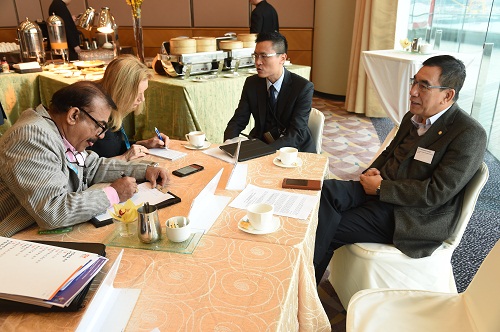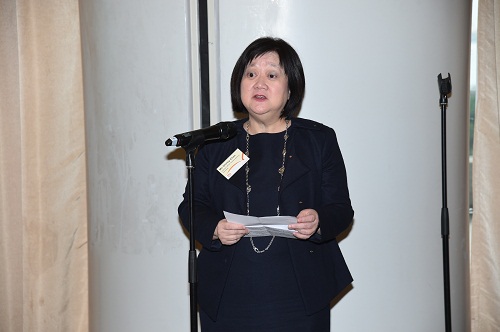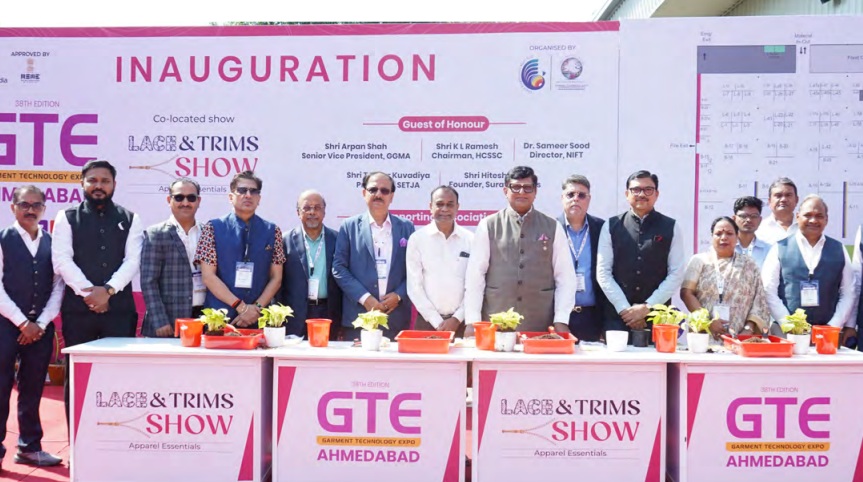FW
Union Ministry of Textiles, India has initiated the process of settlement of Rs 3,000 crores dues related to some 'blackout and left-out' cases which found no mention in the Amended Technology Up gradation Fund Scheme (ATUFS). The process of settlement of dues related to the old cases has started, said Textile Secretary Rashmi Verma.
Secretary General, Confederation of Indian Textile Industry (CITI), Binoy Job said the quantum of liabilities under the blackout and left-out period cases was around Rs 3,000 crores. The settlement of the committed liabilities had been a grey area after the government did not mention anything about it when it notified ATUFS for textile sector last week.
The Union Cabinet approved the ATUFS in December 2015 in place of the Revised Restructured TUFS (RRTUFS) for technology up-gradation of textile industry, a move expected to boost job creation and exports in the sector. During 2010-11, the RRTUFS was suspended for 10 months but eventually restored as a closed-ended scheme and restricted to future sanctions and committed liabilities reported by banks for sanctions already issued.
Experts say, the closed ended scheme was introduced without sufficient notice from the government for preparation on part of lending institutions. Those who had invested in those 10 months in the so-called blackout period were left out and are still awaiting a decision on the eligibility of TUF scheme.
As cotton production is being switched with vegetable farming, Uzbekistan will cut its cotton output by 10 per cent over the next five years, President Islam Karimov says. Production in Uzbekistan, the world's fifth ranked cotton producer, will fall by 0.5million tonnes to 3.0 million tonnes by 2020, according to a speech published on the President's official website recently. Karimov said the move would free up irrigated land for vegetable farming.
During the Soviet period cotton and textile production became Uzbekistan's main industries and the over 1million citizens are mobilised for the annual harvest, in a practice that has sparked accusations of slave labour. Around 40 per cent of production is consumed locally, in a textile industry that accounts for more than a quarter of industrial production. But falling cotton prices, and a drive toward self-sufficiency in food stocks, is encouraging a shift away from cotton.
The government has already achieved its goal of wheat self-sufficiency, and now attention is turning to fruit, vegetable and rice production.
Farmers in certain areas have already been released from a legal obligation to cultivate cotton, although subsidies remain in place. This shift in priorities is putting pressure on irrigated land availability. In November of last year, the US Department of Agriculture forecast a long-term fall in planted areas of cotton in Uzbekistan, but saw production remaining steady thanks to agronomic improvement.
Karimov highlighted the ‘sharp decline of prices and demand for cotton fibre on the world market’ as well as the need for higher vegetable production. Global cotton demand has weakened, as buying from China dries up. Chinese imports have been hit by a slowdown in growth in the industrial economy, as well as very high state-inventories, acquired during a period of stockpiling aimed at supporting domestic farmer incomes. Recently news agencies reported that the Chinese government was preparing to auction off more of its estimated 11million tonnes of inventories, after an abortive auction last year, where less than 1 per cent of the 1million tonnes offered was sold.
As cotton production is being switched with vegetable farming, Uzbekistan will cut its cotton output by 10 per cent over the next five years, President Islam Karimov says. Production in Uzbekistan, the world's fifth ranked cotton producer, will fall by 0.5million tonnes to 3.0 million tonnes by 2020, according to a speech published on the President's official website recently. Karimov said the move would free up irrigated land for vegetable farming.
During the Soviet period cotton and textile production became Uzbekistan's main industries and the over 1million citizens are mobilised for the annual harvest, in a practice that has sparked accusations of slave labour. Around 40 per cent of production is consumed locally, in a textile industry that accounts for more than a quarter of industrial production. But falling cotton prices, and a drive toward self-sufficiency in food stocks, is encouraging a shift away from cotton.
The government has already achieved its goal of wheat self-sufficiency, and now attention is turning to fruit, vegetable and rice production.
Farmers in certain areas have already been released from a legal obligation to cultivate cotton, although subsidies remain in place. This shift in priorities is putting pressure on irrigated land availability. In November of last year, the US Department of Agriculture forecast a long-term fall in planted areas of cotton in Uzbekistan, but saw production remaining steady thanks to agronomic improvement.
Karimov highlighted the ‘sharp decline of prices and demand for cotton fibre on the world market’ as well as the need for higher vegetable production. Global cotton demand has weakened, as buying from China dries up. Chinese imports have been hit by a slowdown in growth in the industrial economy, as well as very high state-inventories, acquired during a period of stockpiling aimed at supporting domestic farmer incomes. Recently news agencies reported that the Chinese government was preparing to auction off more of its estimated 11million tonnes of inventories, after an abortive auction last year, where less than 1 per cent of the 1million tonnes offered was sold.
Switzerland is looking at setting up a Rs 2,000 crores mega textile park in Andhra Pradesh. Swiss-based Gherzi Textile Unit will invest in the textile park. The company says the challenge in Andhra Pradesh lies in adding value to cotton production by weaving and not merely by ginning.
Switzerland is also looking at setting up a solar panel manufacturing plant at an initial investment of $200 million. The solar panel manufacturing company, Meyer Burger, has shown interest in establishing an export-driven project and is considering Visakhapatnam and Kakinada as suitable locations.
Meanwhile Andhra Pradesh has invited Telugu-speaking NRIs settled in Switzerland to set up new industries in the state and be a part of the state’s development process and its flagship Smart Village-Smart Ward program. BKW Engineering Company has been invited to study Andhra Pradesh’s hydro resources and come up with a project proposal after it offered to partner with the state in the conventional energy sector.
Andhra hopes to develop into a knowledge and education hub. NRIs are expected to play an important role in providing access to markets and technology. Ethical Coffee Company has been invited to explore organic coffee plantations at Araku in Visakhapatnam district and ArStaeco to participate in the ongoing e-tendering processing for waste energy in Visakhapatnam.
The year when the TPP and the Vietnam-EU FTA are expected to take effect, the Vietnam National Textile and Garment Group (Vinatex) will strive to raise the local content of its products to 60 per cent as of 2018. Said Tran Quang Nghi, Chairman of Vinatex, only by doing so can the group meet the requirements of these two new-generation FTAs in order to fully benefit from preferential tariffs. In this direction, Vinatex recently started operation of two yarn making factories and a dyeing-weaving plant. A yarn factory in northern Nam Dinh province is scheduled to be launched in the first quarter of this year, while preparations are underway for a yarn-dyeing-weaving complex in the central province of Quang Nam. The complex is expected to supply around 12,000 tonnes of knitted material a year.
By the first half of this year, six other garment making plants are also slated to be completed. However, textile and garment sector experts say it will take some time before the new generation FTAs can actually bring any benefit, as both the TPP and the EU FTA have to wait for Parliament approval in member countries and other time-consuming preparation procedures.
Thus making 2016 a year of many challenges for the sector, more so when 2016 is forecasted as a year of fluctuations in the financial market and the world’s pace of growth.
Denmark and Bangladesh have launched the Strategic Sector Cooperation Project, which aims at improving the health and safety of workers in Bangladesh through the strengthening of labor authorities. The three-year partnership will especially focus on occupational safety and health in the readymade garment sector. The three main objectives of the project are capacity building of, in particular, the Department of Inspection for Factories and Establishments, improving effectiveness of inspections and raising awareness on occupational safety and health.
For three years labor inspectors of Bangladesh and Denmark will be working together to improve the health and safety of workers in the readymade garment sector. Bangladesh has taken a lot of initiatives to improve the situation with regard to worker safety, inspections, and workers’ rights, including trade unions.
So the country has laid emphasis on getting logical prices for its readymade garment products from international buyers. And international buyers are interested in paying an ethical price for the products. However Denmark has laid emphasis on better working conditions, saying ethical pricing of products and better working conditions cannot be compared and that better working conditions will ensure a better price, better productivity and a bigger market.
In fact, business in the readymade garment sector of Bangladesh is not going up. Rather it has decreased by 1.8 per cent in the last year.
CENTRESTAGE being positioned as Asia's Fashion Spotlight will be held from September 7 to 10 this year. An exciting new event is projected to promote Asian designers and fashion brands to buyers. The show will be a combination of exhibition, runways and trend seminars."

HKTDC is all set to introduce a new show named CENTRESTAGE this September to showcase regional and global fashion. The four-day show being positioned as Asia's Fashion Spotlight will be held at the HK Exhibition and Convention Centre from September 7 to 10 this year. The inaugural show, an exciting new event is projected to promote international and local designers and fashion brands to buyers in Asia with a star-studded line-up of regional and international brands and designers.
CENTRESTAGE is projected to be a dedicated marketing platform for international and regional brands, ready to wear and designer labels, with a focus on Asia. Exhibitors can reach regional media, invited fashionistas and fashion buyers, especially from multi-brand stores, select shops, department stores, and fashion e-tailers. An impressive array of events will be held during the fair, making it a premier launch pad to showcase latest collections to the fashion industry.
Show promises never a dull moment “The show will be a combination of exhibition, runways and trend seminars. The first event aims to have a compact size with around 200 participants. Two formats of fashion shows ‘medium’ and ‘large’ are being planned. Medium shows will have an audience base of 400 while large shows would see 800 to 1,000 audiences. We are targeting emerging brands, labels, established and young designers to participate in the event,” explained Byron Lee, Senior Exhibitions Manager, HKTDC talking exclusively to FashionatingWorld.

The show will have four formats for participants. ‘Glam’ for top brands that exemplify hallmark of quality; ‘Allure’ for sophisticated styles that captivate the senses; ‘Metro’ for trendy and sporty designs for daily and casual wear; ‘Forward’ for edgy fashion created by young designers and new labels. The show is a revamped version of World Boutique, Hong Kong, an event that was being held every year coinciding with January show of Fashion Week for the last 13 years. It is being repositioned and rechristened as CENTRESTAGE. “The idea is to align with the latest international fashion calendar, finding the right ‘gap’ in buyers’ calendar,” opines Byron. Explaining further he adds, “The Asia specific event will have an exploding start with new trends featured through runway shows. The show shall have citywide promotions.”
Spotlight is on Asia Established and young designers from HK, Japan, China, Taiwan, Thailand, Indonesia, Korea including India would be participating and offering their products and creations for buyers seeking Asia specific offerings. “We shall welcome buyers from the US, and from the western world but with Asia focused offerings. Asian buyers and Asian products though is the main focus. Emerging country like India would also be a target for designers and brands to showcase. We would be looking for importers, MBOs, select shops, department stores and fashion etailers et al as buyers,” informs Byron, adding that they would be equally targeting brands and designers for participation. However, the number of participant designers would be more from HK.
On whether this would be an ‘Asia to Asia’ focused show, he says, “Yes and no. Of course, the focus is more for Asian offerings. Western buyers’ calendar is generally very tight during September/October and buyers at CENTRESTAGE wouldn’t be looking for western products.”
CENTRESTAGE will further strengthen Hong Kong’s position as Asia’s fashion hub and the annual Hong Kong Young Fashion Designers’ Contest (YDC), which has discovered many talented local designers over the years, will also be held during CENTRESTAGE this year. YDC 2016, will be held under new rules, with four prizes to be awarded: Champion, first runner-up, second runner-up, and Best Footwear & Accessories Design Award (sponsored by i.t). “We are thinking of re-introducing ‘Fashion Extravaganza’ that was part of our earlier World Boutique Fashion Weeks in CENTRESTAGE, where celebrities would be invited in all the shows. The fourth and last day of CENTRESTAGE shall also be open to consumers.”
Rumors about China’s allocation of cotton quotas keep rolling out now-a-days. One rumored version is that among total quantity of 894kt of quotas, 300kt to state-owned enterprises under 1 per cent tariff, 160kt to other eligible textile mills under 1 per cent tariff and 434kt of processing trade quotas.
In another version, 250kt to state-owned enterprises, 150kt to other eligible textile mills and 494kt of processing trade quotas. Moreover, it was heard that some mills have received the notice to apply for the quotas, but according to our sources, most mills did not get this notice. If the quotas do not allocate before the Chinese Lunar New Year, it may be allocated till end Feb, 2016.
As far as importers are concerned, it is a bearish news for them as it is more difficult to get ordinary trade quotas. For quota prices, it is supposed to decrease evidently. In general, the price of cotton quotas depends on the price gap between Chinese cotton and international cotton. Nevertheless, prices are affected by the supply and demand sometimes.
The 2016 cotton planting season is just around the corner and growers are busy studying variety information to make the best seed selections for their farm operations. Last year in the US, Dow Agro Sciences’ Phytogen cotton seed brand was the top planted Pima- and Upland Acala-type cottons in the Golden State, followed by Bayer Crop Science’s FiberMax and Stoneville cotton. Nearly half of the California Upland crop was spread across four Phytogen varieties. More than 82 per cent of the Pima crop was planted in two Phytogen varieties, according to the U.S. Department of Agriculture.
New to PhytoGen’s 2016 Acala cotton seed line-up is PHY 764 WRF with glyphosate resistance and WideStrike. Peck says two Tulare County growers last year yielded 20 per cent more lint with PHY 764 WRF, compared to PHY 725 WRF. PhytoGen’s Pima cotton offerings for California include: PHY 802 RF, PHY 805 RF, PHY 811 RF, PHY 830, plus two new varieties for 2016 - PHY 841 RF and PHY 881 RF. The new varieties have larger seeds compared to most Pima varieties.
Meanwhile, about 45 per cent of Arizona’s cotton acreage last year was planted in Monsanto Deltapine varieties. The company’s DP 1055 B2RF variety was the most popular variety, planted on 23 per cent of the state’s acreage. Dave Albers, Monsanto’s cotton germplasm manager, calls the company’s DP 1044 B2RF, DP 1219 B2RF, and DP 1359 B2RF the “Big Three” varieties in Arizona.
After making inroads in much of Asia, Italian clothing brand Diesel has set its sights on Malaysia. Diesel feels it will sell well in Malaysia, because Diesel-branded fragrances—offered by licensee L’Oréal —are already in demand there. Diesel jeans typically sell for 130 dollars and up, and T-shirts are generally priced between 45 and 150 dollars.
Global brands in search of growth are increasingly relying on Asian economies with a rapidly swelling middle classes. Even as demand for everything from apparel to electronics flattens or shrinks in the West, Asian consumers are still clamoring for such goods. Global brands want to foray in these countries because it’s becoming more important to their bottom line.
However, in countries like Indonesia, a fascination with global brands is colliding with a desire to preserve traditional values. That means global brands have to re-visit the relationships they want to build with people. Only four of the top brands originate in Asia. China does not have a single brand on the global rankings yet. But given the size and volume of Asian business today, it is evident that Asia can build many more prominent global brands and capture more financial value from better price premiums and customer loyalty.













